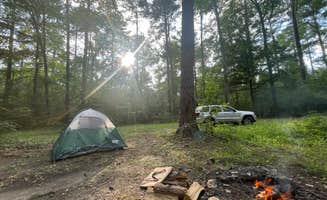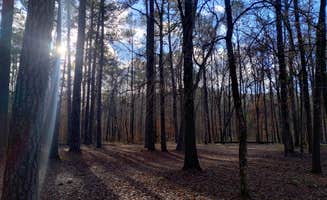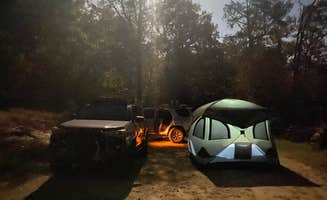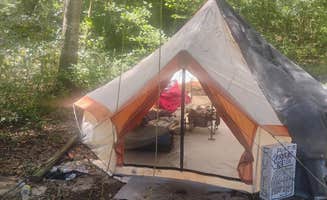Dispersed camping options near Conyers, Georgia primarily involve public land accessible within a 45-minute to 90-minute drive. These areas include Wildlife Management Areas requiring a Georgia hunting or fishing license or land use pass for legal camping. Many locations feature primitive conditions with varying road quality and seasonal considerations. Temperature patterns allow for camping throughout most of the year, with summer months bringing higher humidity and insects while winter nights can drop below freezing.
What to do
Wildlife observation opportunities: Rum Creek WMA provides excellent wildlife viewing, with one camper noting, "Perfect for tent camping. Must have a hunting or fishing license or a land use pass." The area hosts numerous deer, turkey and small game species, especially during early morning and evening hours.
Water activities: Murder Creek Parking Area offers access to natural water features where visitors can enjoy small cascades. A camper described, "Had fun walking down to the water. I suspect in the summer this area is quite the hot spot with swimmers." The creek is approximately 200 feet from the parking area, with gentle shoals suitable for wading during warmer months.
Trail exploration: Ocmulgee River Camp features multiple hiking options including horse trails open to foot traffic. One visitor reported, "Gorgeous site, trails a little rough. Beautiful campsite, just a few neighbors, tons of flat space and a few fire pits." These trails connect to river views and woodland sections, though maintenance varies seasonally.
What campers like
Solitude and stargazing: Many free camping areas near Conyers offer minimal light pollution for exceptional night sky viewing. At Tyler Hunt Camp, one camper mentioned, "This place is a refuge. There are privately owned homes around but the folks keep to themselves. It's quiet, super dark at night and beautiful." The remote setting provides excellent opportunities for star photography without city glow interference.
Natural sounds: Several campers appreciate the ambient sounds at these dispersed sites. At Murder Creek Parking Area, a visitor noted, "Besides the faint traffic noise that is mostly drowned out by the waterfall noise, this place was very quiet." The natural white noise creates a peaceful environment for sleeping and relaxation.
Spaciousness between campsites: Ocmulgee River Camp receives positive mentions for site separation, with one camper stating, "Very nice a bit bumpy on the drive in but no major holes. Quiet and peaceful 2 neighbors great amount of space to find a nice spot." The generous spacing between camping areas provides privacy even when other campers are present.
What you should know
License requirements: Wildlife Management Areas strictly require proper documentation. For Joe Kurz Wildlife Management Area, a visitor emphasized, "Important to note is the requirement for a valid Georgia hunting or fishing license to camp, reflecting the area's primary use for hunting and fishing activities." These licenses can be purchased online through the Georgia Department of Natural Resources or at sporting goods retailers.
Seasonal hunting activity: During fall and winter hunting seasons, camping coincides with hunting activities. One camper at Ocmulgee River Camp observed, "There are hunters around and we heard a good deal of shots. Saw some deer on a walk." Another mentioned, "Train horn in the distance and gunshots in the distance as well from hunters here and there." Orange visibility clothing is recommended during these periods.
Connectivity limitations: Cell service varies significantly across camping areas. At Joe Kurz WMA, one camper stated simply, "No cell coverage, has fire pit, mostly tent and car campers." Visitors should download offline maps and notify others of their plans before arrival at most dispersed sites near Conyers.
Road conditions: Access roads frequently require vehicles with adequate clearance. For Murder Creek, a camper advised, "The lot probably does require a little clearance. So, a sedan may not be the best choice." Rain can significantly impact road quality, especially at wildlife areas with minimal maintenance.
Tips for camping with families
Timing considerations: Weekdays typically offer quieter experiences for family camping. At Murder Creek Parking Area, a visitor observed, "When we arrived, right before sunset in the middle of the week, it was clear that people had camped here. We decided to take a chance and were glad we did. We saw no one that evening or the next morning prior to departure." Mid-week visits minimize encounters with weekend hunters and other recreational users.
Wildlife viewing for children: Rum Creek WMA offers excellent opportunities for children to observe native species. The open meadows near camping areas provide safe viewing distances for deer and turkey, particularly during early morning hours. Binoculars and wildlife identification guides enhance the educational experience.
Temperature preparation: Georgia's climate allows for comfortable camping during multiple seasons with proper planning. At Ocmulgee River Camp, one camper reported, "It was nice and warm even in December! Almost 70 degrees!" while another mentioned, "It was quite hot but surprisingly not that buggy." Layered clothing accommodates temperature fluctuations between day and night, particularly during spring and fall.
Tips from RVers
Size limitations: Most dispersed sites near Conyers accommodate smaller recreational vehicles only. At Joe Kurz Wildlife Management Area, a camper shared, "I went with a travel trailer," but noted the area contains "mostly tent and car campers." RVs exceeding 25 feet may encounter difficulties at turn-around points and with low-hanging branches.
Surface considerations: Parking areas vary in firmness and levelness. Most dispersed camping areas lack designated parking pads, requiring leveling blocks and tire mats during wet conditions. Self-contained water and waste systems are essential as no hookup facilities exist at any of the dispersed camping locations near Conyers.
Generator restrictions: Noise regulations and fire risk management impact generator use. Many Wildlife Management Areas restrict generator operation during certain hours or seasons. RVers should prepare for dry camping with alternative power sources like solar panels or battery banks for essential equipment.





